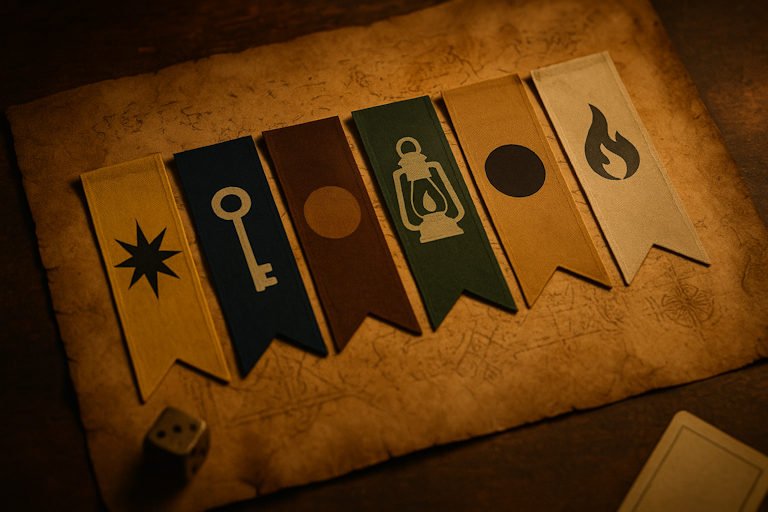
The Hidden Power of Storytelling in Games:
Why It Feels So Captivating (2025)
Storytelling in games is far more than decoration. It is the hidden force that turns rules and mechanics into living experiences. From the moment a player enters a world—whether it’s through a board, a screen, or a whispered instruction—storytelling gives meaning to every choice and every challenge.
Unlike pure competition, which ends when points are counted, stories stay with us. They create emotional bonds, spark imagination, and make victories or defeats feel like part of something larger. When storytelling in games is strong, players don’t just play—they live through an adventure, one that lingers long after the pieces are packed away.
In this article, we’ll explore the hidden power of storytelling in games: what it is, why it matters, and what makes it truly effective. We’ll also look at the secret ingredient that transforms simple play into lasting immersion and connection.
What Is Storytelling in Games?
At its core, storytelling in games is the art of transforming rules and actions into narrative. It is not confined to written text or cinematic cutscenes. Instead, it seeps into every layer of the experience: the world the players step into, the mechanics they interact with, and the choices they are invited to make.
Unlike a book or film, where the audience observes, games invite participation. Every roll of the dice, every decision made under pressure, every unexpected twist becomes part of the unfolding story. This interactivity means the narrative is not something separate from play—it is created in real time, with players as co-authors.
Storytelling can appear in obvious ways, such as characters with backstories or scripted events. But it can also be subtle. A single rule may suggest a hidden danger. A piece of artwork may hint at a larger world just out of view. Even silence—the absence of explanation—can spark imagination, leaving players to fill in the blanks.
Importantly, storytelling in games doesn’t always require words. A chess match tells the story of rivalry and strategy without a single line of dialogue. A cooperative board game can create a tale of survival, victory, or defeat purely through the rise and fall of player choices. In digital games, mechanics like exploration or resource management often become narratives in themselves: the story of how a player succeeded, failed, or barely made it through.
This is what makes storytelling in games so powerful. It bridges the gap between structure and meaning. Without it, a game risks being nothing more than a sequence of actions. With it, even the simplest mechanic becomes infused with purpose. Players walk away not just remembering who won, but remembering the story of how it all happened.

Uncover
The Firefly Inn
Behind its lantern light, secrets wait to be revealed. Step closer, and choose your path into the unknown.
Why Is Storytelling Important in Games?
The reason storytelling in games matters so much is that it transforms play into experience. Rules alone can structure an activity, but they cannot make it memorable. Storytelling gives players something deeper: meaning, emotion, and connection.
One of the most important roles of story is emotional impact. A simple win or loss can be quickly forgotten, but the story behind it lingers. Players don’t just recall that they scored the most points; they remember the tension of a final decision, the betrayal of an ally, or the laughter that came from a shared twist of fate. Storytelling ensures that games are not just played—they are felt.
Story also provides immersion. When a game offers even the suggestion of a larger world, players lean in. The setting, characters, and rules begin to feel alive, and players willingly suspend disbelief. This immersion turns ordinary mechanics into extraordinary moments, where every choice feels significant.
Another reason storytelling is important is connection. Stories link players not only to the game itself but also to each other. A well-told story becomes a shared reference point—something to talk about, retell, and relive. This is why people speak about their favorite game nights or campaigns years later. The story acts as a bridge between memory and meaning.
Finally, storytelling is important because it elevates replayability. A rule set may stay the same, but the story changes with each group of players, each decision, each unexpected outcome. This variety ensures that no two playthroughs are ever identical, keeping games alive far longer than their mechanics alone could.
In short, storytelling matters because it turns games into journeys. It shapes how players engage, what they remember, and why they return. Without story, games can entertain; with story, they can inspire.

Uncover
The Firefly Inn
Behind its lantern light, secrets wait to be revealed. Step closer, and choose your path into the unknown.
What Makes Good Storytelling in Games?
Not all stories in games are created equal. Some fade into the background, while others stay with players for years. Strong storytelling blends design, emotion, and imagination. Here are some of the elements that make storytelling in games truly effective:
- Consistency and coherence: A game world needs to follow its own rules. Even the strangest setting feels believable when it has internal logic that players can trust.
- Player agency: Good storytelling gives players the sense that their choices matter. Whether their decisions change the ending or simply shape the journey, agency turns players into co-authors of the story.
- Emotional depth: Games that evoke laughter, tension, fear, or wonder remain memorable. A well-placed twist or dramatic reveal can carry more impact than a dozen mechanical victories.
- Mystery and discovery: Hidden clues, unfolding secrets, and unanswered questions keep players engaged. Mystery fuels curiosity and makes every small discovery rewarding.
- Integration with mechanics: The best stories are not pasted onto the game—they emerge naturally from play. A desperate roll of the dice, a sudden betrayal, or an unexpected alliance can become story highlights without a single line of dialogue.
- Space for imagination: Leaving gaps for players to interpret invites creativity. When not everything is explained, players fill the blanks with their own ideas, making the story feel personal.

Together, these elements ensure that storytelling in games is not just a backdrop but a living force—one that turns simple rules into experiences worth remembering.
The Hidden Power: Connection and Immersion
The true strength of storytelling in games lies in its ability to connect and immerse. Rules and mechanics can guide play, but story is what makes players feel part of something greater. It transforms games from a pastime into a shared experience.
Connection is one of the hidden powers of storytelling. Stories bind players to each other. They create a common language—moments that can be remembered, retold, and laughed about long after the game ends. A single dramatic twist, a clever move, or a narrow escape becomes more than an event; it becomes a story that belongs to the group. In this way, games build community through shared narrative.
Immersion is the other side of this hidden power. When a game world feels alive, players willingly step into it. They forget the table, the board, or the screen, and act as though they are part of the story itself. This immersion heightens every choice, turning small mechanics into meaningful acts. Winning or losing matters less than the experience of being there.
Together, connection and immersion show why storytelling is not just an accessory in games—it is their beating heart. It ensures that players are not only entertained but also moved, not only occupied but also transformed.
Conclusion: Why Stories in Games Matter
In the end, storytelling in games is what turns play into meaning. Rules create structure, but stories create memory. They bind players together, immerse them in new worlds, and leave behind experiences that last long after the game is over.
Stories in games matter because they do more than entertain. They inspire imagination, spark emotion, and give every action a sense of purpose. They remind us that play is not only about winning or losing—it is about the journey we take together.
That is the hidden power of storytelling in games: it transforms simple mechanics into unforgettable adventures, connecting us not only to the game itself but also to each other.

Uncover
The Firefly Inn
Behind its lantern light, secrets wait to be revealed. Step closer, and choose your path into the unknown.




